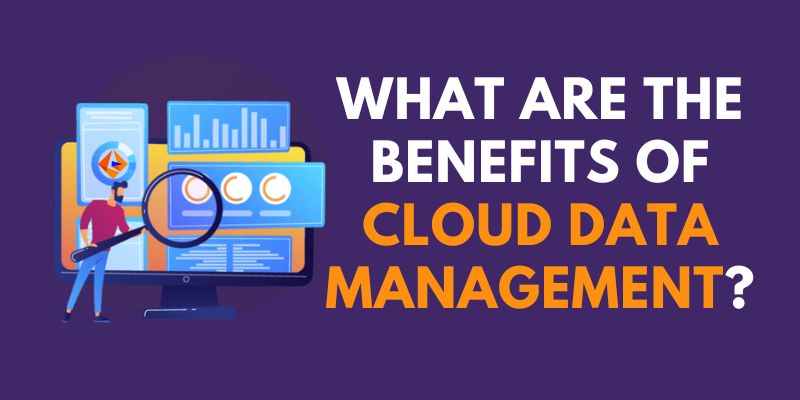
Cloud data management is the mainstreaming of cloud data management platforms and policies, tools, and procedures that provide companies with control over their business data, both in the cloud data and hybrid environments where data is stored or sourced in on-premises and cloud applications.
Organizations are becoming highly increasing aware of the benefits of transferring workloads to the cloud and leveraging the cloud’s agility to optimize new products and services while lowering CapEx and OpEx. As businesses continue to shift IT operations and applications to the cloud, a strategic need for cloud-centric data management tools and platforms capable of managing all types of data. To learn more about Informatica development, join the Informatica Training in Chennai at FITA Academy, which will provide you with a diverse skill set and the best Placement Training.
This blog will explain What are the Benefits of Cloud Data Management.
How Does Cloud Data Management Differ from Traditional Data Management?
Traditional data management systems perform well for on-premises workloads but struggle with cloud-based applications. One option to make data management tools cloud-centric is to build them as cloud-native applications designed to run in the elastic and dispersed environments required by modern cloud computing platforms.
Other essential characteristics of cloud data management platforms (also known as cloud lakehouse data management platforms) are:
- They can manage data across multiple cloud ecosystems (multi-cloud).
- They are API-driven and supplied in the form of microservices.
- They leverage current technologies such as containers and serverless for speedier and more scalable deployment.
- They are easy to install and configure.
- They are simple to manage, including automatic upgrades and patch management.
- They are priced according to service use.
Capabilities for Data Management in the Cloud
Cloud data management should be a major priority for organizations as they build or rebuild their data architectures to adapt to changing business requirements and processes. Here are six critical features to consider when developing a cloud data strategy:
Cloud Integration
The cloud has the potential to spur innovation, identify inefficiencies, and assist in reimagining business processes. However, you can only reap these benefits if your cloud architecture enables you to integrate, synchronize, and connect all data, applications, and processes—whether on-premises or in any portion of your multi-cloud environment.
Businesses may want to create, execute, and automate business processes that span apps more granularly. They may want to leverage orchestration, APIs, and messaging to integrate apps in real-time, or they may want to execute extract transform load (ETL) batch integration jobs for their analytics platforms (cloud data warehouses and data lakes), or they may want to maintain application data synchronized.
Cloud Data Quality and Governance
As businesses place data at the centre of their operations, the most successful organizations recognize the need for high-quality, trusted data in their digital transformation programmes.
Enroll in the Informatica Training institutes in Chennai, Which will provide you with more Concepts about Informatica Security Benefits.
Cloud Data Privacy and Security
Privacy assurance enables you to democratize safe data use, expedite and unblock cloud workload migration, and provide innovative products and services that foster consumer trust. Integrated cloud data privacy and protection tools can assist you in the following ways:
- Automate sensitive data finding and classification.
- Map identities to support data access rules and clear ownership.
- Implement privacy policies.
- Data risk exposure can be modelled and analyzed across data repositories and locations.
- Organise data security.
Cloud Master Data Management
With all the data created across business lines, a 360-degree view of any domain and any relationship in the cloud is required. Furthermore, there is a drive for intelligent data management, improved data search and visualization, and enhanced data verification and enrichment. Cloud master data management (MDM) capabilities synchronize your organization’s most vital data across several systems into a single, certified record, allowing AI and analytics teams to gain deep insights from that data to fuel your business.
Cloud Metadata Management and Data Cataloging
All business transformations rely on reliable data. However, when the data environment becomes more complicated, diversified, and distributed across numerous departments, applications, data warehouses, and data lakes (some on-premises, others in the cloud), it becomes difficult to determine what data you have, where it lives, and how best to manage it.
AI-Driven Enhanced Intelligence
AI features in modern cloud data management platforms enable you to:
- Discover and automatically catalogue data across many systems, such as ERP, CRM, etc.
- Discover correlations between consumer data and match insights to individual people automatically.
- Automate data integration, quality processes, and intelligent policy management and enforcement.
Conclusion
Hopefully, you enjoyed this blog and now understand everything about Informatica, including What are the Benefits of Cloud Data Management.
You can gain more expertise and ability in designing dynamic and interactive web applications by studying at the Informatica Online Training at FITA Academy.
